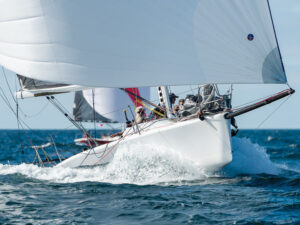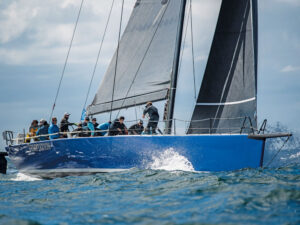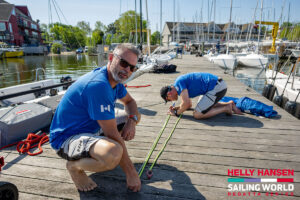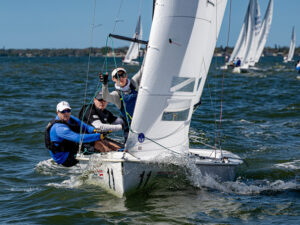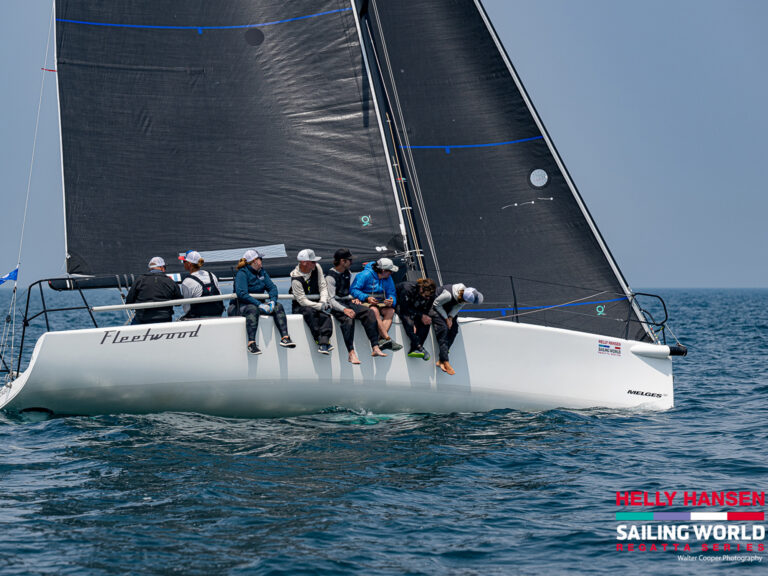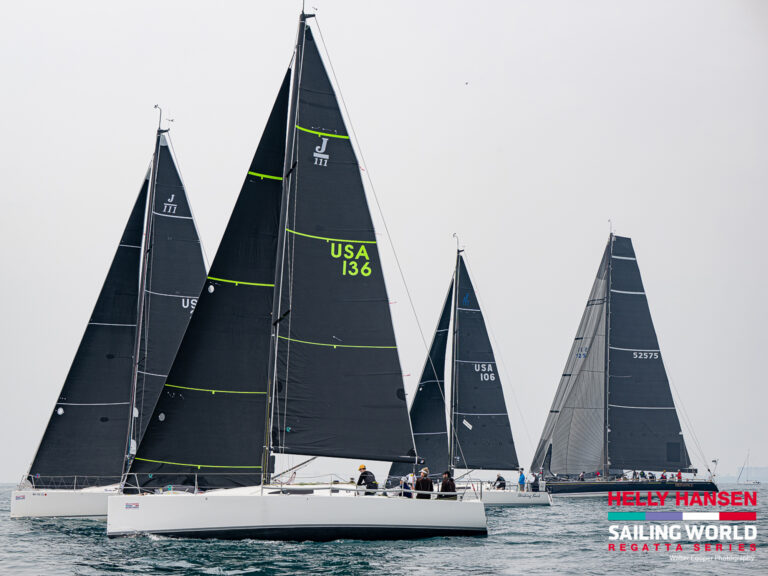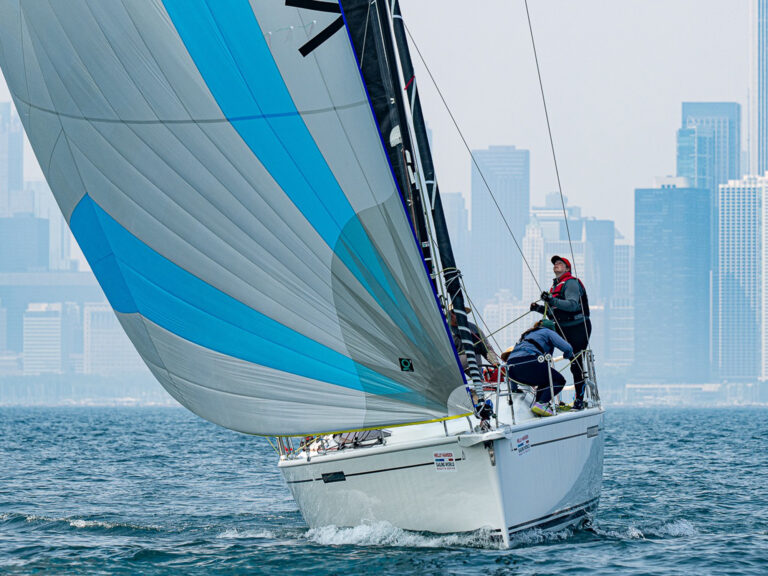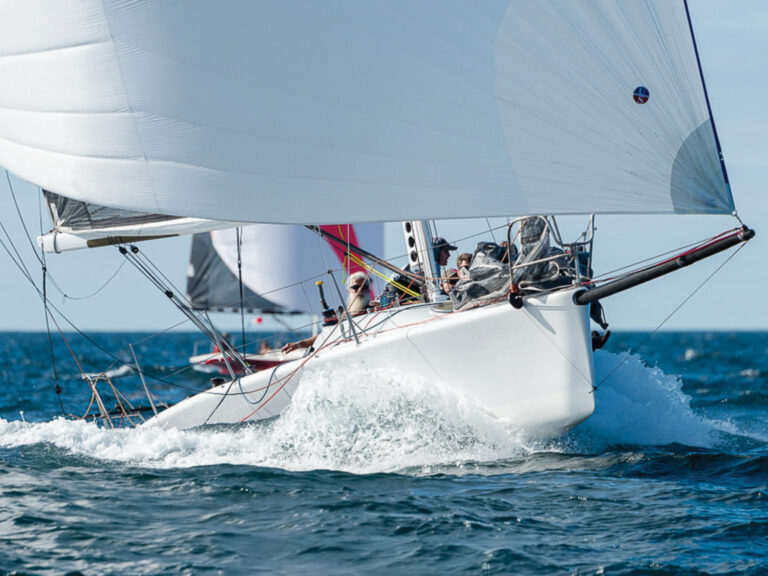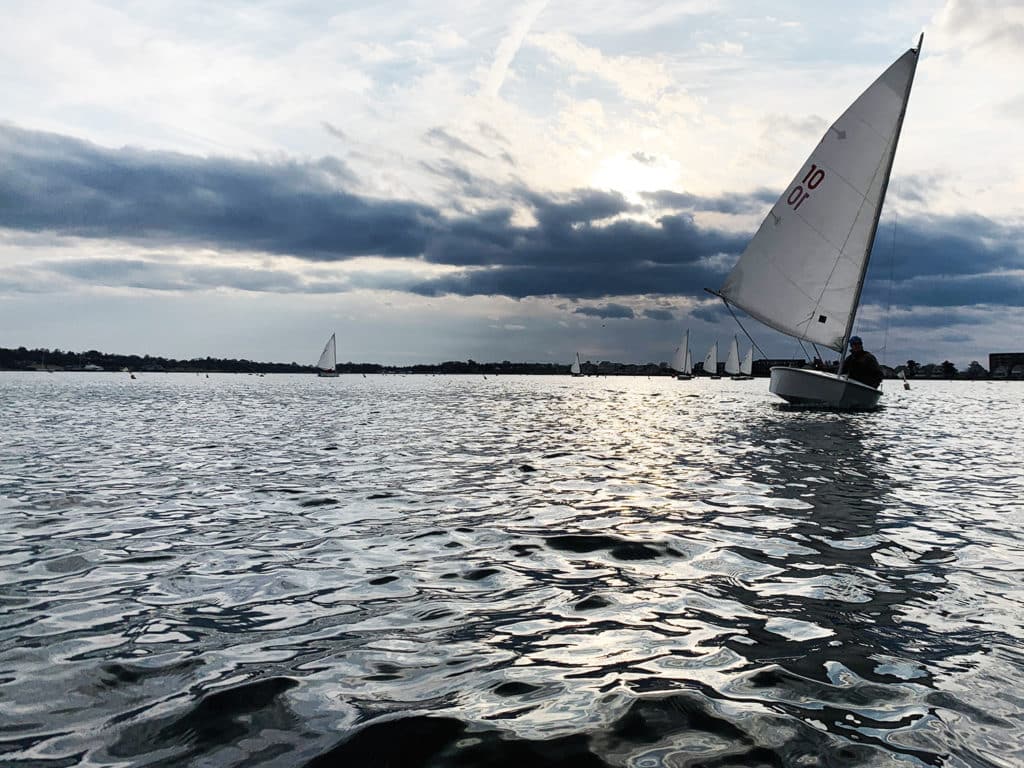
There are mere inches between us as we round the leeward mark, aligned bow to stern. I’m first around and arc gracefully through the turn, onto port tack. My turn is a good one; I pull the mainsheet, the sail loads, and I can feel the acceleration. It’s a beautiful feeling. The play is to get right where there’d been more breeze earlier in the day, as well as the occasional right shift. My bow is pointed toward the open course, and Adam is right behind me. All I have to do is stay between him and the next mark, and I’ll have my first race win of the season. I tell myself to exhale, relax and stay in tune with the boat. Don’t get slow, pay close attention to the sensory cues: Notice the feel of the light breeze across my face, listen to the sound of the water gurgling off the Turnabout’s transom, and look up the course for the next dark wind line.
Adam lifts off me a bit, but I’m bow forward, footing slightly to the layline where I anticipate the next shift will come. The slightest bubble in the front of my sail is all the clue I’ll need, and when it happens, it’s helm’s-a-lee. Adam tacks as well, and now he’s to leeward and a few lengths forward. We’re locked in our own little match race. The weather mark is not far off, and I think I’ve got him in control. A little header comes, but I subconsciously ignore it. As long as I have Adam in my sight, that’s all that matters. He’s fast, and he’s the guy I need to beat.
But because of my tunnel vision, I’m ignoring the rest of the fleet to my right. My eyes are forward; never once do I glance over my shoulder. I’m clueless to what’s happening behind me. Once we’re squared up to the middle of the racecourse, straight downwind from the weather mark, we both tack back to port, and a bolt of shock and disbelief spears me right between the eyeballs. Three boats are cruising in on the starboard layline, easily crossing ahead of us. They’ve banged the right side, and we’ve failed to cover them. The next leg is a short reach to the finish, so the damage is done, and all my visions of race-winning glory and praise are sunk right there and then.
Fourth is the best I can do, and after crossing the finish line, I curse myself under my breath. I feign a smile when I step onto the dock for the boat rotation. Adam and I commiserate our misfortune and put it to one that got away. He’s laughing it off and taking it better than I am. The right thing to do is to let it go. Next race. But I can’t. I’m embarrassed. I so desperately want to win a race, to be congratulated and feel proud. The right thing to do is to accept the fact that I was so focused on beating one boat, I made the mistake of losing sight of the big picture. Get over it, right? Nope. Instead, my frustration festers, and like a toxin, it poisons the rest of my day.
Over the next three races, there’s a deeper and darker inner drive to prove to myself and everyone else in the fleet that I don’t suck. It clouds my decision-making, makes me slow, and makes me tack more than I should in the light and shifty breeze. In each of the following three races, my starts are magical; I cross the line at full speed and with clear air, and I’m leading both races when I tack onto a thin starboard layline. But each time, inexplicably, the wind dies and shifts, and in a span of two boatlengths, I’m no longer fetching the mark. Twice I have to jibe around and duck five or six boats that are easily laying the mark. The third time, I have to tack to do the same. Hero to zero, indeed. Three races in a row, in the blink of an eye, I go from the front of the fleet to the back. I’ve proved to myself that I’m not nearly as good as think I am, or wish I am, and for one fleeting moment, as I return to the dock, sullen and depressed after my eighth-place finish (of 12 boats), I think maybe I should take up a new sport.
Sailors with a growth mindset don’t take results personally. They don’t care about shame or embarrassment: They care only about using their mistakes as an opportunity to learn and improve.
I help derig a few boats, peel out of my drysuit, and sulk out the back door of the club without saying goodbye to anyone. During the 20-minute drive home, my mind is racing, processing, replaying the highlight reel in my head, trying to pinpoint what went wrong and where. What the hell was my problem? It continues when I get home: I vent over dinner with my wife. I stand in the hot shower cursing myself again. Even reading in bed fails me; I can’t stop thinking about how terribly I sailed.
The next morning, I open my laptop at the office, and coincidentally the file on screen I’d been working on is Jonathan McKee’s column, “Success Through Failure,” in this issue (page 48). I wish I’d read it before I sulked out of the club. “In sailboat racing, we fail all the time,” he writes. “Even top racers are consistently making mistakes large and small—take it from me. A growing body of research into learning and brain plasticity suggests that the manner in which a person processes mistakes and failure will impact their growth and future performance.”
In his column, he applies his understanding of the emerging study of the “growth mindset,” where we take failure personally, and feel shame and embarrassment when we make a mistake. He could say I’m a textbook example of a “fixed mindset.” All I can think about is the outcome. Sailors with a growth mindset, on the other hand, don’t take results personally. They don’t care about shame or embarrassment: They care only about using their mistakes as an opportunity to learn and improve.
McKee’s words are like honey in my bitter morning tea. They don’t erase the scores that have caused me to tumble down the standings, but they do help me correct my course, change my attitude and dive deeper into understanding what should motivate me every Sunday morning when I show up for frostbite sailing. This is true in life as well: I need to embrace this growth mindset, shift my tunnel vision away from my results and my reputation, and focus instead on the more fruitful process of improving, of accepting my failures simply as headers: Recognize them, tack on them, and enjoy the lifts.

